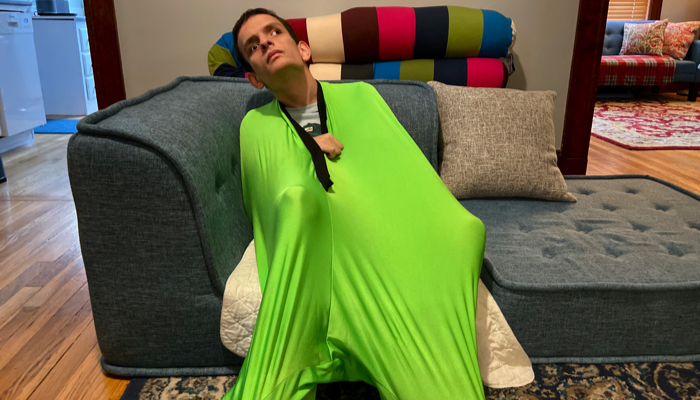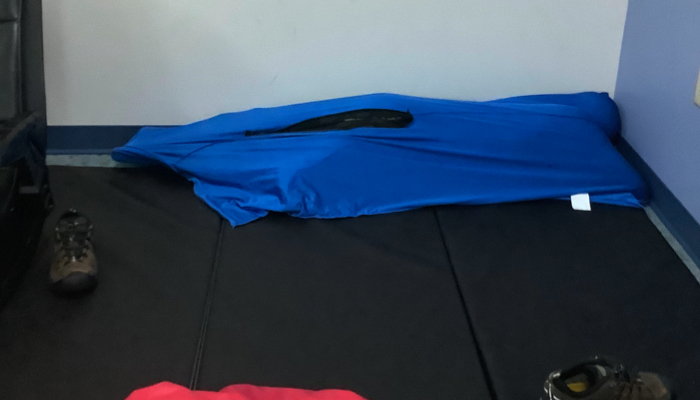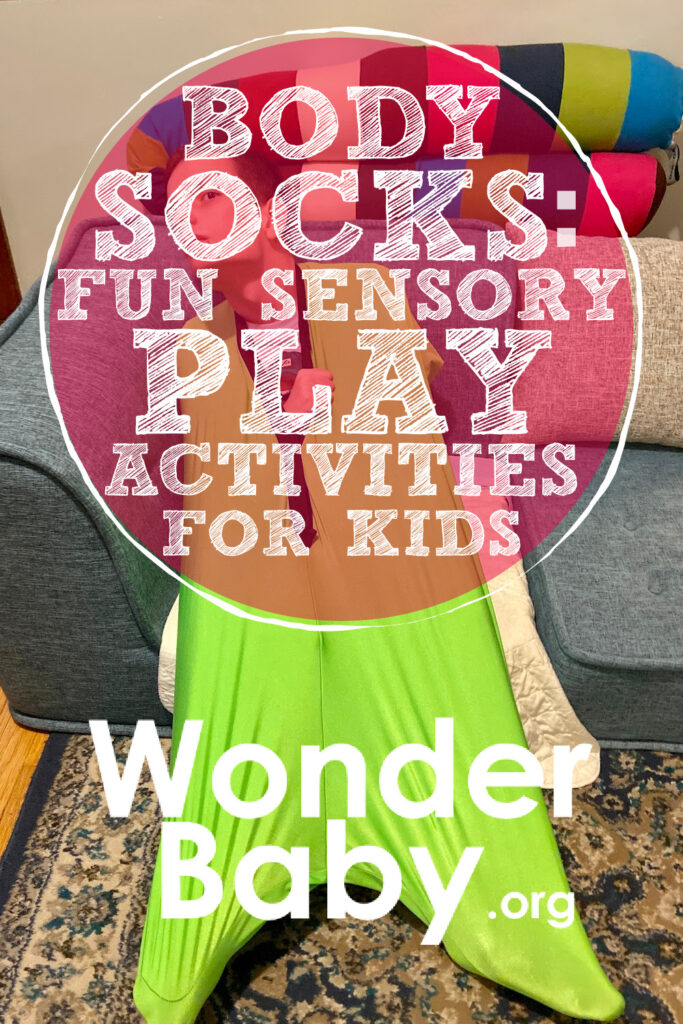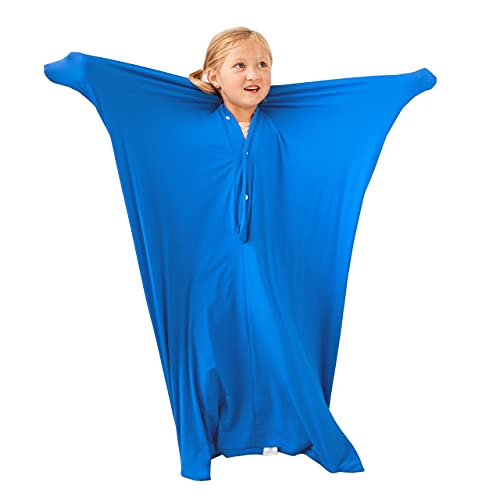Body Socks: 10 Fun Sensory Play Activities for Kids

- Sensory body socks are stretchy sacks that your child’s whole body fits into.
- They are particularly helpful for children who crave sensory input, but all kids can benefit from them.
- The proprioceptive input and deep pressure they provide can help to calm children.
- They are also a great tool for heavy work and gross motor skills development.
- Your child can stretch, balance, and explore different movements in the sock.
- From obstacle courses to yoga poses, there are so many fun ways to use a body sock! Equally, you can put them to use during quiet and calm time.
As a teacher of children with additional needs, I’m always looking for helpful tools to support them at home and in the classroom.
My favorite products are entertaining, versatile, and support development. A sensory body sock ticks all these boxes and, in my experience, kids absolutely love them!
Often used in occupational therapy sessions, they provide resistance, sensory input, and body awareness while your child plays.
There are so many different ways to use a body sock. No matter what your little one is interested in, there are bound to be plenty of options to keep them entertained.
What Is a Body Sock?
Made of breathable and stretchy fabric, a body sock is a fun sensory tool that can be used in a variety of ways.
They are what they sound like – a giant sock-like sack that fits your child’s body inside!
You’re most likely to see occupational therapists using them, but they’re also a great addition to try at home.
Why Are Body Socks Beneficial for Kids?
Sensory body socks can provide creative fun and calming opportunities for all kids.
They are especially beneficial to children with additional sensory input needs, such as autism or other sensory processing disorders.
Sensory Input
The resistance created by the snug fabric provides vestibular input and proprioceptive input. In simple terms, this is an awareness of our body in space – its movement, balance, and coordination.
This deep pressure input from the sock helps calm the sensory systems and helps to prevent sensory meltdown.
Motor Skills
Body socks are fantastic for motor planning skills development as your child explores different movements with their arms, legs, and core.
Choosing the Right Body Sock for Your Child
There are many different options you can choose from when choosing a sensory body sock. You’ll need to consider the following when deciding which is right for your child:
Age and height of your child
Some manufacturers organize their products by intended age. This can give you a general idea, but most importantly, you want to make sure the length is right for your child’s height.
The body sock should be near to your child’s height or a little smaller to give the correct level of resistance.
Material of body sock
Lycra is often the chosen material for a sensory body sock. Others use spandex, polyester, or a mixed fabric blend. Children have different sensory preferences and it’s important to choose a material that they find comfortable. If you’re not sure which material would be best for your child’s needs, consider asking their occupational therapist.
Closures
Most body socks use velcro to close the opening, which can be easier for your child to independently open and close. If your child finds velcro too scratchy, you may want to pick a sensory sack with snap or zipper closures.
10 Body Sock Sensory Activities for Kids
Body socks are incredibly versatile and can be both calming or stimulating, depending on how you use them.
Let your kids’ imaginations run free to create their own play ideas, or try some of these body sock activities:
1. Gross Motor Play
Movement play is so exciting inside a sensory sock! Create challenges that invite your child to move their head, arms, and legs in interesting ways.
One creative way to do this is playing the classic children’s game ‘Simon Says’ inside the sock. You could also ask them to mirror your movements or see how many different ways they can find to move across the room in the sock.
2. Obstacle Course
To add an extra element of gross motor challenge, set up obstacles for your child to navigate while wearing the sock. This is perfect for practicing whole-body movements such as climbing, rolling, and balancing.
3. Reading Den
Body socks are calming and reduce sensory overload. Make it a regular feature of quiet time or use it for story time. You could fill the sack with stuffed animals or blankets to make it extra cozy.
4. Yoga or Dance
Stretch and balance with some yoga poses such as downward dog or tree pose or get groovy and throw a sock dance party for some guaranteed giggles.
5. Sock Shapes
Challenge your child to make themselves into different letters, shapes, or objects while wearing the sock. They could try to spell out a word, or take turns to guess the shadow shape with a flashlight and a blank wall.
6. Break Tool
A sensory body sock can provide a welcome break following a tiring or over-stimulating activity. If you have a sensory room or quiet space in your home, try adding a body sock as another tool your child can use to help them to soothe and regulate. One of our friends even enjoys a relaxing swing while in his body sock!
7. Carnival of the Animals
For lovers of music, The Carnival of the Animals by Camille Saint-Saëns inspires children to explore animal movements in the sock. Try gliding like a swan or plodding like a tortoise!
8. Getting Dressed
Does your little one like a challenge or need practice getting dressed independently? Set a timer and see how quickly they can get themselves in and out of the sock!
9. Ready, Set, Go!
Many kids enjoy a race, so why not introduce a body sock for a spin on the classic sack race. Some fun ideas to explore include a wheelbarrow sock race, bunny hop race, or relay race.
10. Play!
Play in the sock with your child’s interests and ideas in mind.
Do they love dinosaurs? Try dinosaur role-play and fly like a pterodactyl!
Do they prefer quiet games? Have your child lay on the floor cocooned in the sensory sock to complete a puzzle. You could even create a sensory corner with a play mat, a body sock, and a bean bag chair!

The options are limitless here. Play tug, combine it with time on a sensory swing, try hide and seek, or any other games your imagination can think of!
FAQs
Can You Sleep in a Body Sock?
While the material is breathable, most manufacturers do not recommend sleeping inside the sock.
You can, however, buy sensory compression bed sheets or a sensory sleeping bag that uses the same stretchy material.
Can You Make Your Own Body Sock?
You can! With some lycra fabric and a sewing machine, you can make a sensory body sock at home.
Can Body Socks Help Kids with ADHD?
This study found that children with ADHD were more likely to have sensory processing difficulties, so a body sock may help them.
The socks are also great for gross motor activities, giving your little one plenty of opportunities to move with intention.
Are There Any Safety Concerns With Body Socks?
Adult supervision is recommended while your child is playing in their body sock.
Be especially mindful if they have their head inside it or if they can’t get out of it independently. Also, consider the surface your child is playing on as they can be slippery.

Related Posts

Sensory Activities
5 Sand Play Activities to Encourage Fine Motor Development
Sensory bin, at the beach, or in a sandpit? Try these sand play activities to help toddlers and preschoolers develop their fine motor skills.

Sensory Activities
5 Edible Sensory Play Ideas
Check out our favorite edible sensory play activities to engage children's senses, boost their development, and provide hours of fun.

Sensory Activities
How to Make Unpoppable Bubbles
Discover the secret to making unpoppable bubbles with this easy guide. You only need three ingredients!



